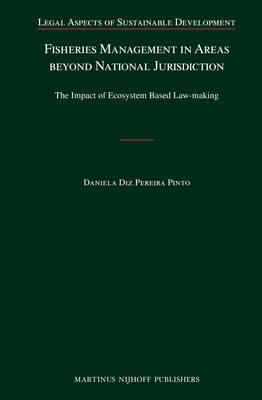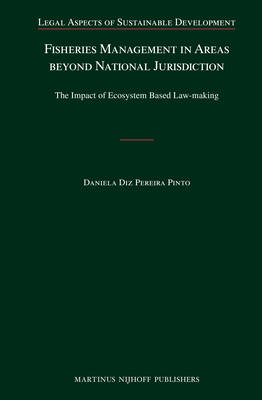
- Afhalen na 1 uur in een winkel met voorraad
- Gratis thuislevering in België vanaf € 30
- Ruim aanbod met 7 miljoen producten
- Afhalen na 1 uur in een winkel met voorraad
- Gratis thuislevering in België vanaf € 30
- Ruim aanbod met 7 miljoen producten
Zoeken
Fisheries Management in Areas Beyond National Jurisdiction
The Impact of Ecosystem Based Law-Making
Daniela Diz Pereira Pinto
€ 228,95
+ 457 punten
Omschrijving
Traditional fisheries management - based on single-species - has proved to be inadequate to sustainably manage living resources, due to the highly complex structure of marine ecosystems. Recent developments in marine scientific research have indicated that the ecosystem-based approach, which takes into consideration the interdependence among species and their habitats, is the most appropriate way to sustainably manage marine living resources. Shifting from single-species approach to ecosystem-based fisheries management (EBFM) in areas beyond national jurisdiction (ABNJ) is extremely important, because species occurring in these regions are often more vulnerable to collapse than coastal species due to their biological characteristics.
Fisheries Management in Areas beyond National Jurisdiction describes recent developments of the law of the sea in light of ecosystem approach to fisheries management (EBFM) and conservation of biodiversity in marine biodiversity. Author Daniela Diz Pereira Pinto analyzes this urgent subject in light of the United Nations General Assembly's recent mandate to initiate a process to improve upon the conservation and sustainable use of marine biodiversity in areas beyond national jurisdiction, which includes the potential development of a multilateral agreement under the United Nations Convention on the Law of the Sea. The monograph interprets states obligations under the current regime, identifies governance gaps, and provides a number of recommendations and best practices that could be incorporated into a new implementing agreement to UNCLOS. A historical overview of EBFM provides useful context for the future development of a more comprehensive legal regime.
Fisheries Management in Areas beyond National Jurisdiction describes recent developments of the law of the sea in light of ecosystem approach to fisheries management (EBFM) and conservation of biodiversity in marine biodiversity. Author Daniela Diz Pereira Pinto analyzes this urgent subject in light of the United Nations General Assembly's recent mandate to initiate a process to improve upon the conservation and sustainable use of marine biodiversity in areas beyond national jurisdiction, which includes the potential development of a multilateral agreement under the United Nations Convention on the Law of the Sea. The monograph interprets states obligations under the current regime, identifies governance gaps, and provides a number of recommendations and best practices that could be incorporated into a new implementing agreement to UNCLOS. A historical overview of EBFM provides useful context for the future development of a more comprehensive legal regime.
Specificaties
Betrokkenen
- Auteur(s):
- Uitgeverij:
Inhoud
- Aantal bladzijden:
- 228
- Taal:
- Engels
- Reeks:
- Reeksnummer:
- nr. 13
Eigenschappen
- Productcode (EAN):
- 9789004241992
- Verschijningsdatum:
- 23/10/2012
- Uitvoering:
- Hardcover
- Formaat:
- Genaaid
- Afmetingen:
- 155 mm x 236 mm
- Gewicht:
- 476 g

Alleen bij Standaard Boekhandel
+ 457 punten op je klantenkaart van Standaard Boekhandel
Beoordelingen
We publiceren alleen reviews die voldoen aan de voorwaarden voor reviews. Bekijk onze voorwaarden voor reviews.








